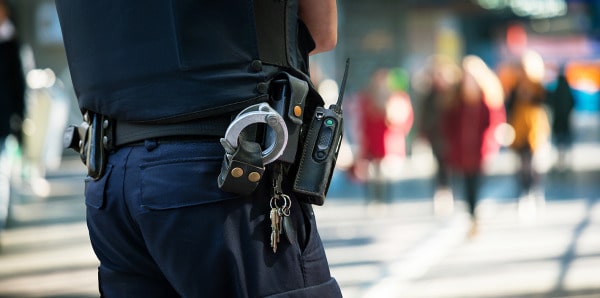What is the Excessive Use of Force?
When apprehending or subduing a suspect, law enforcement is allowed to use reasonable physical force. Typically, such use of force would include bracing a suspect against a wall or the ground as he/she handcuffs the suspect.
If a suspect resists, then law enforcement is authorized to counter the resistance with additional degrees of force, including lethal. In most cases, the use of force by a law enforcement officer is justified.
However, when the degree of force trips the reasonable line into excessive, and, in some cases, fatal, the services of an experienced criminal defense attorney may be needed. The California Legislature is currently considering legislation that would restrict the use of lethal force by law enforcement to those situations in which it is necessary to prevent imminent and serious bodily injury or death.
A discussion of the excessive use of force by law enforcement, as well as the proposed law, will follow below.

Current Use of Force Law
The use of force generally means the amount of effort required by law enforcement to compel compliance by an unwilling individual. Use of force doctrines are employed by law enforcement in an effort to balance the needs of security with ethical concerns for the rights and well-being of individuals.
In other words, law enforcement is permitted to use physical force to the extent necessary to secure observance of the law or to restore order only when the exercise of persuasion, advice, and warning is found to be insufficient.
Excessive force refers to situations where law enforcement, otherwise legally entitled to use force, exceed the minimum amount necessary to diffuse an incident or to protect themselves or others from harm. Constitutionally speaking, an individual’s right to be free from the excessive force is found in the reasonable search and seizure requirement of the Fourth Amendment and the prohibition on cruel and unusual punishment in the Eighth Amendment.
Existing California law authorizes law enforcement to arrest individuals pursuant to a warrant or based upon probable cause. Under this law, an arrest may be made by the actual restraint of the individual or by submission to the custody of the arresting law enforcement officer. Further, this law authorizes a law enforcement officer to use reasonable force to effect the arrest, to prevent escape, or to overcome resistance.
Additionally, current law does not require a law enforcement officer to retreat or desist from an attempt to make an arrest because of resistance or threatened resistance of the individual being arrested.
If an arrestee dies due to excessive force, the homicide would most likely be justifiable if committed when the individual has committed a felony and is either fleeing or resisting the arrest.
California’s New Regulation on Excessive Force
AB 392, if passed, would redefine the situations in which a homicide by law enforcement is justifiable. Specifically, homicide would be justifiable if in self-defense or the defense of another, or when necessary to prevent the escape of a felon whose immediate apprehension is necessary to prevent death or serious injury.
Further, the bill would deem a homicide unjustifiable if law enforcement acted in a criminally negligent manner, including if the criminally negligent actions created the necessity for the use of deadly force.
How Much Force Can Police Use During an Arrest?
The U.S. Supreme Court has held that the right of law enforcement to make an arrest or investigatory stop necessarily carries with it the right to use some degree of physical coercion or threat. However, the degree of force used by law enforcement must be proportional to the threat and only escalate in response to the threat.
Excessive force refers to situations where law enforcement uses force that exceeds the amount necessary to diffuse an incident or to protect themselves or others from harm. The Constitutional right to be free from the excessive force is found in both the reasonable search and seizure requirement of the Fourth Amendment and the prohibition against cruel and unusual punishment of the Eighth Amendment.
Again, turning to the Supreme Court, the Court has set the floor by noting that lethal force can only be used during an arrest if:
- Such force is necessary to prevent the escape of the suspect; or
- Law enforcement has probable cause to believe that the suspect poses a significant threat of death or serious physical injury to the officer or others.
In California, the law notes that, when law enforcement has reasonable cause to believe a suspect has committed a crime, he/she “may use reasonable force to effect the arrest, to prevent escape or to overcome resistance.”
If the suspect flees or forcibly resists, law enforcement “may use all necessary means to effect the arrest.” Finally, it should be noted that, if a suspect is aware or should be aware that he/she is being arrested, they are required “to refrain from using force or any weapon to resist such arrest.”
Additionally, the U.S. Supreme Court has held that law enforcement, only with probable cause to believe a suspect poses a threat of serious harm to the officer or others, may use deadly force to prevent escape. However, law enforcement is instructed to warn a suspect before using deadly force.
Actions that Can Be Considered Excessive Force by Police
As mentioned above, the California Assembly is debating a bill that would raise the floor set by the U.S. Supreme Court, and permit law enforcement to use lethal force only when necessary to prevent imminent and serious bodily injury or death to law enforcement or a third party.
Accordingly, the lethal force would only be justified in the following situations, given the totality of the circumstances:
- There are no reasonable alternatives available, including warnings or other non-lethal means; or
- Where law enforcement has probable cause to believe that the person has committed or intends to commit, a felony involving serious bodily injury or death, and there is an imminent risk of serious bodily injury or death to the officer or to another person if the subject is not immediately apprehended.
Additionally, the bill would make a homicide committed by law enforcement justifiable only if, as stated above, the use of lethal force was necessary given the totality of the circumstances, but, importantly, would exclude those situations in which the gross negligence of law enforcement contributed to the necessity.
Can I Sue the Police for Excessive Force?
If you are the subject of the excessive use of force by law enforcement, engage the services of an experienced criminal defense attorney as soon as possible. The Los Angeles attorneys at the Manshoory Law Group, APC handle a wide variety of criminal offenses and know how to use evidence of the excessive force to convince judges and prosecutors to dismiss, drop or reduce criminal charges.
Attorneys are available 24/7 to take your call. Contact us today for an initial consultation.


